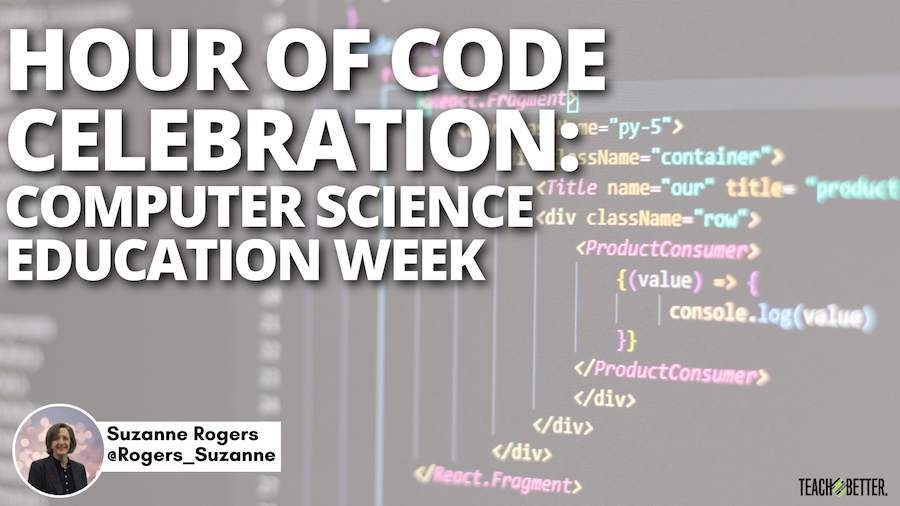TL;DR:
- Bilingualism enhances cognitive skills, academic performance, and global competency.
- Schools can support multilingual students with culturally responsive teaching, resources, and family collaboration.
- Encouraging bilingualism builds inclusion, celebrates diversity, and prepares future leaders.
Every December, Computer Science Education Week (CSWeek) inspires students, educators, and lifelong learners to explore the world of coding. This week-long event, held annually in honor of computing pioneer Grace Hopper, encourages students to dive into the basics of programming. One of the most popular activities during CSWeek is the Hour of Code. This initiative, backed by industry leaders like Microsoft, empowers anyone to learn how to code, regardless of experience level.
What is Hour of Code?
Hour of Code is a free, one-hour coding activity that introduces students to computer science in an accessible, engaging way. Microsoft says, “With just one hour of coding—whether during CSEdWeek or anytime throughout the year—anyone can learn the basics of coding.” Schools, libraries, and organizations around the globe participate in this movement, making coding accessible to millions of learners. This year, Hour of Code is expected to be bigger than ever, thanks to a new AI-focused tutorial from Minecraft Education.
Introducing Minecraft Hour of Code: Generation AI
This year, Minecraft Education brings an exciting new tutorial called “Minecraft Hour of Code: Generation AI.” This activity introduces students to the basics of AI through the popular Minecraft platform. It’s designed to be fun, interactive, and highly educational, allowing students to build and explore within the game while learning how AI works. As artificial intelligence continues to shape the world, Generation AI gives students a valuable introduction to this innovative field.
By introducing coding through storytelling, you can build interest and make complex concepts like loops, engineering, and problem-solving more accessible. Share on XWhy Participate in Hour of Code?
Learning to code offers numerous benefits beyond the skill itself. Coding teaches problem-solving, critical thinking, and creativity—skills that are essential for today’s students and tomorrow’s leaders. During CSWeek, schools nationwide celebrate Hour of Code, helping students see that coding can be fun, rewarding, and within reach.
Participating in Hour of Code can also inspire students to pursue further studies in computer science. With the rapid growth of technology careers, computer science skills are in high demand. Through CSWeek, schools and educators have a fantastic opportunity to introduce students to coding as a potential career path.
How to Get Started
For teachers and parents, getting involved in Hour of Code is simple. Visit the official Hour of Code website to access tutorials, lesson plans, and resources tailored for all ages. There, you’ll find beginner-friendly tutorials and activities that make coding accessible to anyone. Many of these resources are free and provide a fantastic introduction to the world of programming.
Join the Movement
As we celebrate Computer Science Education Week, let’s encourage students to participate in Hour of Code and explore the endless possibilities of computer science.
[scroll down to keep reading]Not Ready to Code? Read These Books!
If you’re not quite ready to jump into coding activities, reading books about coding and engineering can be a great way to introduce students to computer science and spark their curiosity.
1. How to Code a Sandcastle by Josh Funk
Reading this book aloud provides a natural opportunity to discuss how loops allow coders to simplify instructions, reduce errors, and write cleaner code.
2. Doll-E 1.0 by Shanda McCloskey
Doll-E 1.0 demonstrates that programming is all about tinkering, iterating, and making discoveries—skills essential for young coders and engineers.
3. Rosie Revere, Engineer by Andrea Beaty
A beloved classic, Rosie Revere, Engineer, shows students that every failure is a step closer to success.
These books make fantastic additions to any classroom or home library and can provide students with a strong foundation in the concepts they’ll encounter during Hour of Code and beyond. By introducing coding through storytelling, you can build interest and make complex concepts like loops, engineering, and problem-solving more accessible.
About Suzanne Rogers
Suzanne M. Rogers is an accomplished, passionate, technology-inspired educator, experienced conference presenter, and yoga enthusiast. She is the Assistant Director of Public Relations at LISA Academy Public Charter Schools. In addition to her 20 years of work in education, Suzanne also serves on the Arkansas Museum of Fine Arts Educator Advisory Board, the UCA Executive Advisory Board, the UCA MAT Program Advisory Board, and the SAU ERZ Advisory.
Suzanne’s passion for education and her community is evident in her involvement in these organizations, where she works tirelessly to support students and educators. As an #ArmyMom and former #AFbrat, Suzanne brings a unique perspective to her work, understanding firsthand the sacrifices made by military families. Suzanne exemplifies dedication, expertise, and commitment to excellence.



